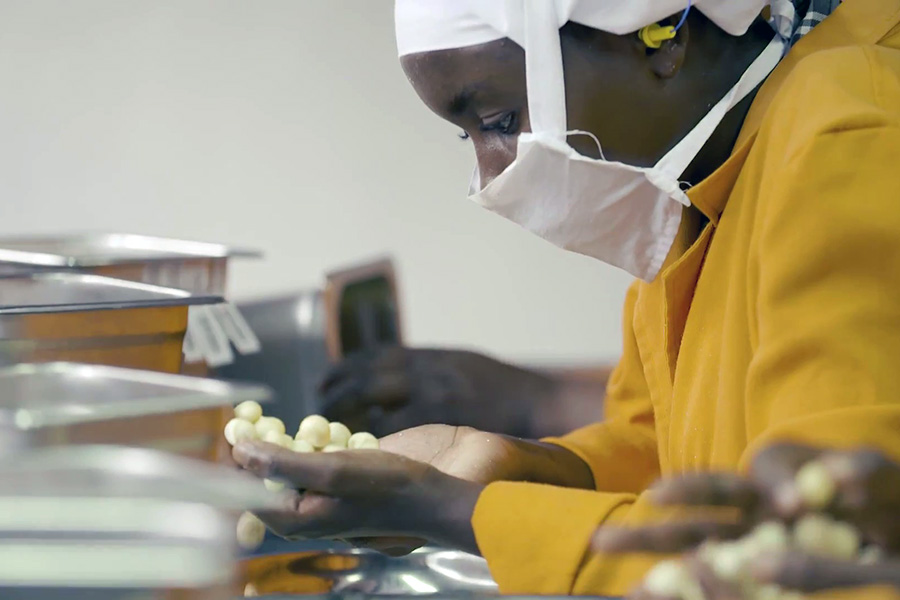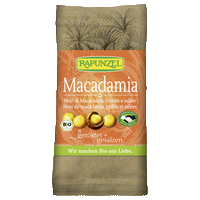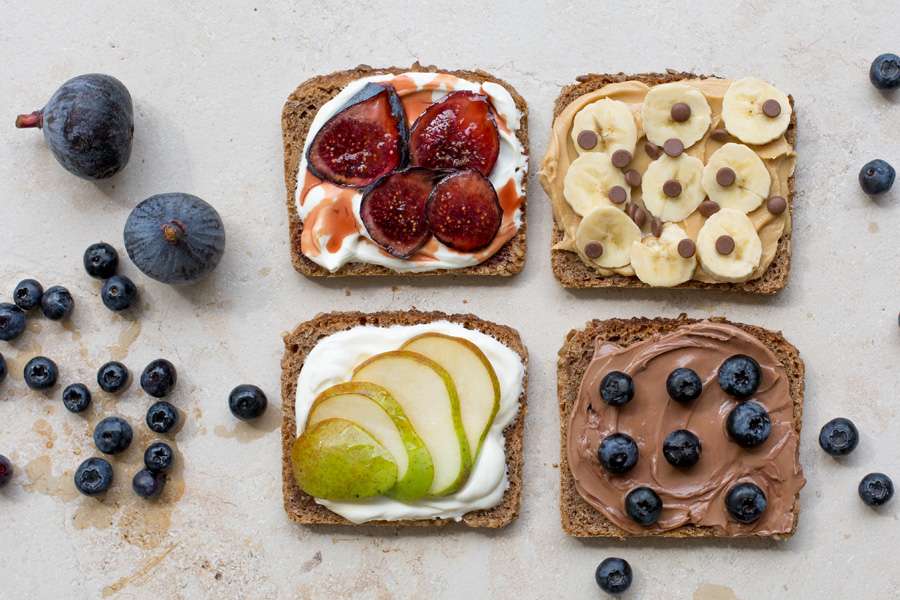Organic-Fair Farming HAND IN HAND-Partner
Macadamia and coffee – mixed cultivation is the trump card
LIMBUA – Fair. Digital. Future-proof.
Macadamia and coffee – mixed cultivation is the trump card
LIMBUA has been a HAND IN HAND partner of Rapunzel since 2020. The German-Kenyan social enterprise works with over 9,000 certified organic smallholder farmers at the foot of Mount Kenya – and focuses on a combination of traditional agriculture, fair trade and digital innovation.
LIMBUA in brief
- Social enterprise with over 900 employees.
- Processing and export of organic macadamia nuts and organic arabica coffee in the highlands of Kenya
- Cooperation with more than 9,000 smallholders, cultivation of coffee and macadamia nuts in mixed cultivation in the regions of Embu and Kirinyaga
- Founded in 2006, cooperation with Rapunzel since 2018, HAND IN HAND partner since 2020
CSR Prize 2025 for LIMBUA – award for transparent supply chains
German government’s CSR Prize 2025 for digital supply chains

At Limbua, the entire manufacturing process is digitally recorded - from sorting and cracking the nuts to packaging and export
What is now a real showcase project once started very small: “A trip around the world during my studies to visit social entrepreneurs in 25 countries in Asia, Latin America and Africa inspired me to found an organisation that I personally associate with a high degree of meaningfulness,” emphasises entrepreneur Matti Spiecker. Together with the Kenyan Anthony Ngondi, he founded LIMBUA – “good harvest” in German – in 2006.
Mixed cultivation on Mount Kenya – organic farming with diversity

Farmer, Esther Njoki (l.), and her family proudly present a basket of their macadamia harvest.
Arabica coffee, for example, thrives on the volcanic soils of the mountainside and forms a perfect marriage with macadamia trees – which not only provide shade, but also valuable nuts.
Macadamia and coffee
The mixed farms of the smallholder families are located at an altitude of 1,500 m, directly on the equator. Despite the proximity to the equator, this altitude ensures a subtropical climate, with cool nights and very warm days. The volcanic, fertile soils here, in the vicinity of Mount Kenya, are ideal for organic farming. The climate and soil are very conducive to Arabica coffee’s quality and aroma. In addition, the farmers can do without artificial irrigation, thanks to rainfall of over 1,000 mm per year. At the same time, it does not rain too much: Arabica coffee prefers to draw moisture from clouds and fog, which, thanks to the cool nights, provide optimal conditions.
On average, a family has one hectare of cultivated land. Apart from coffee shrubs and other crops such as bananas, mango, cassava, chilli and pepper, there are about 20 macadamia trees on this land. Besides its nuts, the macadamia tree offers other benefits as well. Thanks to its thick leaves, it provides shade for other plants and offers protection against evaporation. Its roots prevent erosion and bind water on the surface. Thus, with each tree, the surrounding flora is also promoted, fostering a healthy ecosystem.
For Arabica coffee, the farming families carry out the first processing steps in a decentralised manner, too. They pick the coffee cherries by hand – the main harvest is between October and January – and always only the fully ripe ones, thus providing the most aromatic coffee beans. They use the so-called wet process to remove the pulp, i.e., the outer layer, and dry the beans in the sun. LIMBUA then removes the silver skin from the bean and prepares the coffee for export.
The main harvest of macadamia nuts takes place once a year, from February to April. Directly on their farm, the smallholders separate the harvest from the outer, green shell. Shelled in this way, LIMBUA buys the nuts directly from the farmer families, without any middlemen, and processes them for the world market.
So far, LIMBUA sells the coffee in small quantities. This is because it is a new product for the company – thanks to the demand coming from Rapunzel. For the smallholder families, the cooperation between LIMBUA and Rapunzel fulfils a wish of being able to market the coffee as well.
So far, LIMBUA sells the coffee in small quantities. This is because it is a new product for the company – thanks to the demand coming from Rapunzel. For the smallholder families, the cooperation between LIMBUA and Rapunzel fulfils a wish of being able to market the coffee as well.
On-site processing – real added value in Kenya

Quality control: the cracked macadamia nuts are carefully checked at LIMBUA.
LIMBUA’s commitment as a social enterprise

More security, better prospects – that is what LIMBUA's vision brings to the families on Mount Kenya.
A large proportion of employees are also women. The pay exceeds the minimum wage by far, and the female employees also receive contributions to health, nursing care and pension insurance, which is not a matter of course in Africa.
Digital innovation meets social impact
What makes LIMBUA unique: the company has developed a system that enables trade with thousands of small farmers in the first place – without any large monocultures or intermediaries. Every step, from purchasing and payment to certification, is digital and transparent. Payment is made directly to the farmer’s mobile phone – fast, secure and traceable.
"The important starting point was the question of what a healthy, future-oriented partnership between Europe and Africa could look like," the founder, Matti Spiecker, explains. "This is how the LIMBUA concept was developed, where as much of the value creation as possible takes place in the smallholder communities."
What makes LIMBUA unique: the company has developed a system that enables trade with thousands of small farmers in the first place – without any large monocultures or intermediaries. Every step, from purchasing and payment to certification, is digital and transparent. Payment is made directly to the farmer’s mobile phone – fast, secure and traceable.
"The important starting point was the question of what a healthy, future-oriented partnership between Europe and Africa could look like," the founder, Matti Spiecker, explains. "This is how the LIMBUA concept was developed, where as much of the value creation as possible takes place in the smallholder communities."
- Small farmers receive direct market access and fair prices
- Over 5,000 hectares of land have been converted to organic farming
- Over 900 employees work at four decentralised processing sites
- The region benefits from stable incomes, education, healthcare and prospects
Together for organic, fairness and transparency
LIMBUA’s products – including macadamia nuts and Arabica coffee – are processed locally and exported worldwide. At Rapunzel, these are incorporated directly into the macadamia cream or the hero coffee Kenya. Rapunzel and LIMBUA have been working together as equals for many years. "The fact that the smallholder farmers receive stable prices from us has improved even more thanks to HAND IN HAND," Matti Spiecker confirms.
Together, we are committed to sustainable agriculture in which human rights, environmental and climate protection and economic participation go hand in hand.
LIMBUA’s products – including macadamia nuts and Arabica coffee – are processed locally and exported worldwide. At Rapunzel, these are incorporated directly into the macadamia cream or the hero coffee Kenya. Rapunzel and LIMBUA have been working together as equals for many years. "The fact that the smallholder farmers receive stable prices from us has improved even more thanks to HAND IN HAND," Matti Spiecker confirms.
Together, we are committed to sustainable agriculture in which human rights, environmental and climate protection and economic participation go hand in hand.
HAND IN HAND-Products

Macadamia spread HAND IN HAND

Macadamia nuts roasted, salted


Recipes with fair HAND IN HAND-Macadamia nuts roasted, salted

Colorful Breakfast Toast

Brioche with macadamia filling
